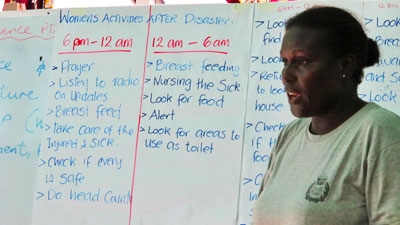When a large earthquake and tsunami struck Solomon Islands in 2007, the country was caught off guard. There were no disaster management plans to deal with the scale of the disaster.
Earthquakes and tsunamis are not the only natural hazards that pose danger to its population of over half a million people scattered across the archipelago. Cyclones have been the usual visitor. Sea level rise and tidal surges, which are occurring at an increasing and unusual pattern, are a new type of hazard the country is now coming to terms with.
Fast forward five years, and a national disaster management plan is now in place. Work is underway to get the country’s nine provinces to have their own provincial disaster management plans and standard operating procedures. Efforts are also being made to consider the different roles and needs of women and men in emergencies.
Fred Talo has been involved with disaster reduction activities and disaster risk management for many years. “I have been involved with a lot of disaster management training courses at national, provincial and community levels, but there’s never been a clear say about gender and protection,” he said.
This year, with World Bank support, Fred has helped deliver a ‘gender and protection in emergencies’ training program, in partnership with the Solomon Island’s Government through the National Disaster Management Office.
Workshops on Gender Protection in Emergencies
From May 2012 to June 2013, workshops on gender protection in emergencies were held in four provinces.Participants included local government staff, police, protection and disaster risk management representatives, and civil society members.
The workshops were designed to give a solid understanding of the different needs and abilities of the participants to help design standard operating procedures for provincial emergency response.The workshops also alerted participants, especially men, to the special vulnerabilities women might face during an emergency, for example pregnancy or lactation, which translate to different needs such as separate bathrooms, enforced security or access to female doctors.


